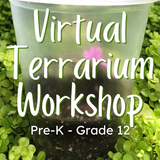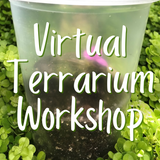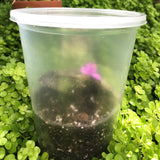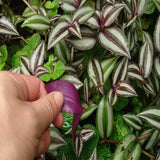Virtual Terrarium Workshop
Can’t get out of the classroom? Visit virtually! Our virtual hands-on workshop includes all supplies needed for each student to create their very own terrarium. Students will learn what plants need to grow and discover the inner workings of the water cycle while creating the perfect habitat for a tropical plant. This virtual program includes individually packed supply kits for each student along with a virtual Sway presentation with instructions. Live virtual instruction can be added on for an additional fee.
Age Range: Pre-K – Grade 12
Cost: $11 per kit, one free teacher kit is included
Live Virtual Instruction: $100 per one hour session via Zoom or Teams
2024 Pricing effective January 1, 2024: $12 per kit, $150 per one hour session via Zoom or Teams
Group Size Required: minimum of 15 students
Supply Pick-Up: Hands-on supplies must be picked up. Pick-up dates and times must be coordinated when reservation is made.
This field trip supports the following learning standards:
- P-LS1-1. Observe familiar plants and animals (including humans) and describe what they need to survive.
- P-LS1-2. Plan and conduct an investigation to determine how familiar plants and/or animals use their external parts to help them survive in the environment.
- K-LS1-1. Use observations to describe patterns of what plants and animals (including humans) need to survive.
- K-ESS3-1.Use a model to represent the relationship between the needs of different plants or animals (including humans) and the places they live.
- 1-LS1-1. Use materials to design a solution to a human problem by mimicking how plants and/or animals use their external parts to help them survive, grow and meet their needs.
- 3-LS1-1. Develop models to describe that organisms have unique and diverse life cycles but all have in common birth, growth, reproduction and death.
- 3-LS3-2. Use evidence to support the explanation that traits can be influenced by the environment.
- 4-LS1-1. Construct an argument that plants and animals have internal and external structures that function to support survival, growth, behavior and reproduction.
- 5-PS3-1. Use models to describe that energy in animals; food (used for body repair, growth, motion and to maintain body warmth) was once energy from the sun.
- 5-LS1-1. Support an argument that plants get the materials they need for growth chiefly from air and water.
- 5-LS2-1. Develop a model to describe the movement of matter among plants (producers), animals (consumers), decomposers, and the environment.
- MS-ESS2-4. Develop a model to describe the cycling of water through Earth’s systems driven by the energy from the Sun and the force of gravity.
- HS-LS2-3. Construct and revise an explanation based on evidence for the cycling of matter and flow of energy in ecosystems.
Reservations are required for all programs. Please reserve your programs at least three weeks in advance of the desired program date to ensure adequate supplies and staffing.














